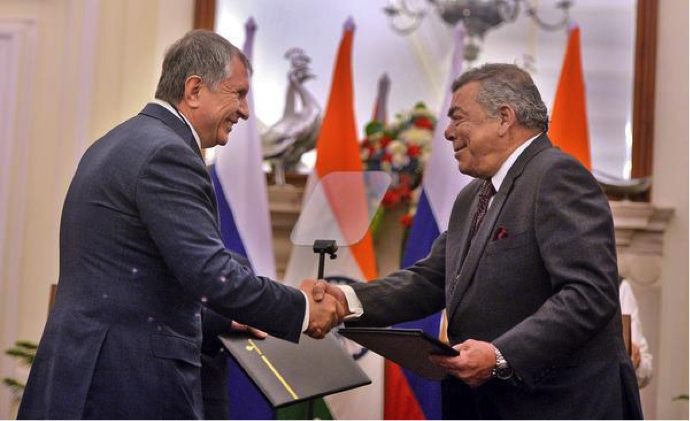by Elisabeth Nguebana
Photo: Rosneft President, Igor Sechin, and Essar Chairman, Shashi Ruia, both gain as the Russian company gains Indian retail customers and Essar gets to pare debt. File photo: R.V. Moorthy
Rosneft, the Russian energy giant, has its eyes on the Indian oil products market. To increase its presence in the Indian market, the company intends to acquire shares in the Indian company Essar Oil. This deal is of spectacular cost (12,9 billion USD dollars for 98% of this Indian refiner). It seems that it will ensure a strategic bridgehead in the extremely promising market with potential of expansion into other Asian markets. The deal includes a 49% split equally between Trafigura and UCP in order to avoid the Western sanctions against Russia and Rosneft directly.
Essar Oil is an Indian company engaged in the exploration and production of oil and natural gas, refining of crude oil, and is present in more industries, such as steel, ports, and power. In the refining sector, the company represents the second largest player in India, supplying 20 million tons per year and 9% of the local market for refined products. Essar Oil is the owner of the refinery in Vadinar (West), which is one of the biggest of the country. The complex refinery has access to a deep-water port capable of accommodating VLCC tankers and is one of the most modern in the world. It is highly flexible in terms of raw materials use and capable of refining heavy and ultra-heavy oil. The refining capacity in Vadinar is 20 mln tons per year. The partners plan to more than double the refinery’s capacity to 45 mln tons by 2020. Essar also runs 2,700 gasoline service stations as part of the Essar Group based in Mumbai.
This development can be seen in the broader context of Russian interests in Asia. In October 2016, Russia’s president Vladimir Putin took part in the BRICS summit in Goa. BRICS is the group of emerging economies comprising Brazil, Russia, India, China and South Africa, and Russia attaches high importance to activities within this group. The deal of Rosneft and Essar Oil was one of the biggest reached at the summit in Goa.
For India, the deal represents a case of significant foreign investment. For Russia, the deal can be compared to a ‘strategic victory’ as India is one of the most promising and quickly growing markets in the world. One additional significant factor is that India is an important player in international markets for refined products. While India is a net importer of crude oil; it is a net exporter of oil products. Moreover, the deal opens opportunities in other markets of the Asia Pacific region such as Indonesia, Vietnam, Philippines and Australia.
Developments in Asia send a message to the European Union and to the United States that Russia has solutions in developing its energy sector, despite Western sanctions imposed against the Russian petroleum industry and Rosneft in particular.

Storage tanks of an oil refinery of Essar Oil, which runs India’s second biggest private sector refinery, are pictured in Vadinar in the western state of Gujarat, India, October 4, 2016. REUTERS/Amit Dave
Douglas Busvine and Denis Pinchuk, 2016. India’s Essar agrees to sell oil arm to Rosneft-led group. Reuters, 16 October, 2016. http://www.reuters.com/article/us-essar-oil-m-a-rosneft-oil-idUSKBN12F05P
Simon Mundy, 2016. Mumbai, Rosneft Leads $13bn purchase of Essar OIl. Financial Times. 17 October, 2016. https://www.ft.com/content/9756ccca-92d7-11e6-a1dc-bdf38d484582
Piyush Pandey, 2016. Rosbeft-led group acquires Essar Oil for nearly $13 billion. The Hindu. 15 October, 2016. http://www.thehindu.com/business/Industry/indiarussia-bilateral-meeting-on-the-sidelines-of-brics-summit-rosneftled-group-acquires-essar-oil-for-nearly-13-billion/article9224107.ece
Saket Sundria and Unni Krishnan, 2016. Rosneft, Trafigura to Spend $13 Billion to Buy Indian Refiner. Bloomerg. 16 October, 2016. http://www.bloomberg.com/news/articles/2016-10-15/rosneft-trafigura-to-buy-98-stake-in-essar-oil-for-13-billion

